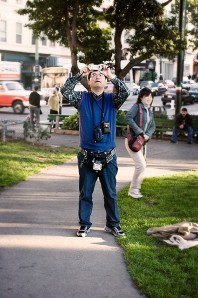It’s not all that long ago that a popular stereotype of East Asians was their love of taking photographs.
In 80s films it was quite common to have them depicted as trigger-happy photographers. Typically, a camera would either be hung around the photographer’s neck or firmly attached to the eye as they rapidly took pictures. As action in the film unfolded, they were pictured never far behind – manically capturing images of fallen victims left lying in the protagonist’s wake.
I realise now that in Korea this stereotype is not far from the truth.
When I lived in Busan and then Ulsan (Korea’s second and fourth largest cities) I became the subject of several ‘memory photographs’. This is where the locals stand and stare and in some instances point as they seemingly attempt to burn the image of one’s face into their brain. Neither Busan nor Ulsan could be described as rural, yet being in a public place meant that eyes would constantly be on me. Generally, children were more obvious when doing this and if they happened to be caught out were less likely to be deterred and simply continued staring. On two occasions I was actually doing something as normal as standing at a bus stop lost in my own thoughts when slowly, through whatever primeval sense it was, I would become aware that someone was staring at me. In both cases it was a

child facing me wide eyed and pointing at my face whilst saying; ‘Waygook! Waygook!’ (foreigner, foreigner!)
Thankfully, on each occasion it was a different child; otherwise I would have been seriously concerned that I was being stalked by a malevolent midget.
I must confess that the first few times people looked at me it gave me the elevated feeling of celebrity status. But as the incidents increased this sensation quickly faded away to be replaced by a feeling of discomfort. But all that is now in the past. Since moving to Seoul, an international city, that particular intensity of undesired scrutiny is rarely encountered.
Today, cameras are commonplace. Technology has merged the camera with the phone (as well as a mini-computer). So it is no longer necessary for consumers to buy a camera and a phone separately should they wish to just take fun snaps. This gives everyone the ability to live their life through a lens or, in Korea’s case, see their life through one.
Alongside this surge in people taking photographs the stereotype of the snap-happy East Asian as depicted in the majority of 1980s films has grown less. Here in Korea the focus is now more often on the photographer. What you will often hear in public places is the sound of a camera shutter emanating from a mobile phone signalling a captured image. And this could well be a vain young woman with phone held at arm’s length photographing herself. Very rarely does this narcissism stop with a single self-portrait. Shot after shot is taken – all consisting of the same pose. The lone photographer’s self-love is apparently insatiable.
 Stepping in front of the lens and being photographed is one way for Koreans to express themselves. Disappointingly, expression rarely summons up individuality. As westerners we are told to ‘smile’ before the shutter clicks. Here, as the countdown begins ‘Hana, dul, set’ (One, two, three), the subject is alerted to take the ‘Kimchi Pose’. This consists of two fingers stuck up at the camera imitating the ‘V for Victory’ sign.
Stepping in front of the lens and being photographed is one way for Koreans to express themselves. Disappointingly, expression rarely summons up individuality. As westerners we are told to ‘smile’ before the shutter clicks. Here, as the countdown begins ‘Hana, dul, set’ (One, two, three), the subject is alerted to take the ‘Kimchi Pose’. This consists of two fingers stuck up at the camera imitating the ‘V for Victory’ sign.
It is a well-established gesture which communicates to the viewer that the person being photographed is happy.
What’s more, the Kimchi pose is actually from a long list of many instilled into Koreans from an early age as proper behaviour or etiquette for the person whose picture is being taken. Other signs include; Bang! Heart Shape, Nyan Nyan (a ‘cat’ pose) and many more. You can find examples and pictures at Asian Poses.
 As yet it is unlikely for a foreigner to be the brunt of a cascade of clicking cameras, as this is still deemed as intrusive. Instead it seems the staring and the memory photographs will long remain paramount.
As yet it is unlikely for a foreigner to be the brunt of a cascade of clicking cameras, as this is still deemed as intrusive. Instead it seems the staring and the memory photographs will long remain paramount.
© John Brownlie 2010


Recent comments